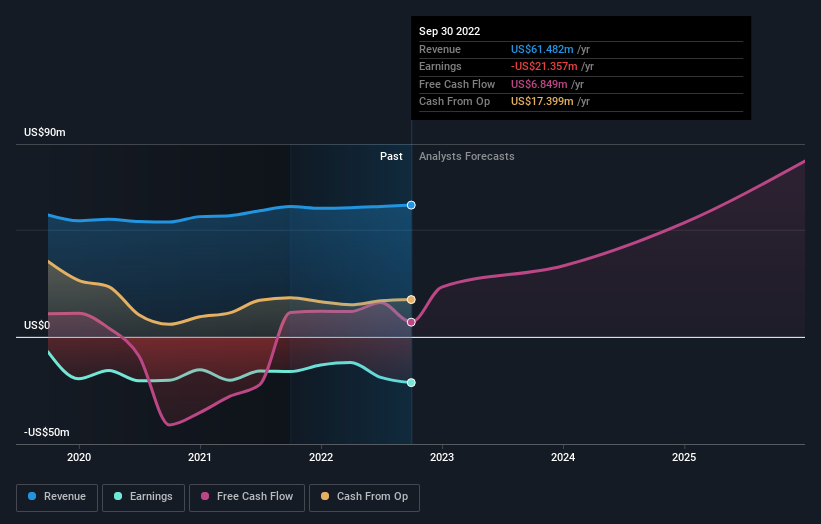In the wake of HLS Therapeutics Inc.'s (TSE:HLS) latest CA$48m market cap drop, hedge funds owners may be forced to take severe actions

Key Insights
- Institutions' substantial holdings in HLS Therapeutics implies that they have significant influence over the company's share price
- A total of 4 investors have a majority stake in the company with 57% ownership
- Analyst forecasts along with ownership data serve to give a strong idea about prospects for a business
If you want to know who really controls HLS Therapeutics Inc. (TSE:HLS), then you'll have to look at the makeup of its share registry. And the group that holds the biggest piece of the pie are hedge funds with 33% ownership. In other words, the group stands to gain the most (or lose the most) from their investment into the company.
As a result, hedge funds investors endured the highest losses last week after market cap fell by CA$48m. Needless to say, the recent loss which further adds to the one-year loss to shareholders of 53% might not go down well especially with this category of shareholders. Hedge funds are often aggressively managed, usually with the goal of focusing on short-term profits. And given they have significant interest in HLS Therapeutics, they have a lot of power, and if the company's performance doesn't improve, it could lead to them influencing management decisions that aren't in line with long-term objectives.
Let's take a closer look to see what the different types of shareholders can tell us about HLS Therapeutics.
Check out our latest analysis for HLS Therapeutics

What Does The Institutional Ownership Tell Us About HLS Therapeutics?
Institutions typically measure themselves against a benchmark when reporting to their own investors, so they often become more enthusiastic about a stock once it's included in a major index. We would expect most companies to have some institutions on the register, especially if they are growing.
HLS Therapeutics already has institutions on the share registry. Indeed, they own a respectable stake in the company. This implies the analysts working for those institutions have looked at the stock and they like it. But just like anyone else, they could be wrong. When multiple institutions own a stock, there's always a risk that they are in a 'crowded trade'. When such a trade goes wrong, multiple parties may compete to sell stock fast. This risk is higher in a company without a history of growth. You can see HLS Therapeutics' historic earnings and revenue below, but keep in mind there's always more to the story.

Our data indicates that hedge funds own 33% of HLS Therapeutics. That catches my attention because hedge funds sometimes try to influence management, or bring about changes that will create near term value for shareholders. The company's largest shareholder is Stadium Capital Management, LLC, with ownership of 18%. With 15% and 13% of the shares outstanding respectively, Polar Asset Management Partners Inc. and Athyrium Capital Management, LP are the second and third largest shareholders. Furthermore, CEO Gilbert Godin is the owner of 2.9% of the company's shares.
Our research also brought to light the fact that roughly 57% of the company is controlled by the top 4 shareholders suggesting that these owners wield significant influence on the business.
While it makes sense to study institutional ownership data for a company, it also makes sense to study analyst sentiments to know which way the wind is blowing. There are plenty of analysts covering the stock, so it might be worth seeing what they are forecasting, too.
Insider Ownership Of HLS Therapeutics
The definition of an insider can differ slightly between different countries, but members of the board of directors always count. The company management answer to the board and the latter should represent the interests of shareholders. Notably, sometimes top-level managers are on the board themselves.
Most consider insider ownership a positive because it can indicate the board is well aligned with other shareholders. However, on some occasions too much power is concentrated within this group.
We can report that insiders do own shares in HLS Therapeutics Inc.. It has a market capitalization of just CA$232m, and insiders have CA$7.7m worth of shares, in their own names. It is good to see some investment by insiders, but we usually like to see higher insider holdings. It might be worth checking if those insiders have been buying.
General Public Ownership
The general public-- including retail investors -- own 32% stake in the company, and hence can't easily be ignored. While this size of ownership may not be enough to sway a policy decision in their favour, they can still make a collective impact on company policies.
Private Equity Ownership
With a stake of 13%, private equity firms could influence the HLS Therapeutics board. Some might like this, because private equity are sometimes activists who hold management accountable. But other times, private equity is selling out, having taking the company public.
Next Steps:
I find it very interesting to look at who exactly owns a company. But to truly gain insight, we need to consider other information, too. To that end, you should be aware of the 1 warning sign we've spotted with HLS Therapeutics .
If you would prefer discover what analysts are predicting in terms of future growth, do not miss this free report on analyst forecasts.
NB: Figures in this article are calculated using data from the last twelve months, which refer to the 12-month period ending on the last date of the month the financial statement is dated. This may not be consistent with full year annual report figures.
Valuation is complex, but we're here to simplify it.
Discover if HLS Therapeutics might be undervalued or overvalued with our detailed analysis, featuring fair value estimates, potential risks, dividends, insider trades, and its financial condition.
Access Free AnalysisHave feedback on this article? Concerned about the content? Get in touch with us directly. Alternatively, email editorial-team (at) simplywallst.com.
This article by Simply Wall St is general in nature. We provide commentary based on historical data and analyst forecasts only using an unbiased methodology and our articles are not intended to be financial advice. It does not constitute a recommendation to buy or sell any stock, and does not take account of your objectives, or your financial situation. We aim to bring you long-term focused analysis driven by fundamental data. Note that our analysis may not factor in the latest price-sensitive company announcements or qualitative material. Simply Wall St has no position in any stocks mentioned.
About TSX:HLS
HLS Therapeutics
A specialty pharmaceutical company, acquires and commercializes pharmaceutical products for the treatment of psychiatric disorders, central nervous system, and cardiovascular disease in Canada, the United States, and internationally.
Mediocre balance sheet and slightly overvalued.
Similar Companies
Market Insights
Community Narratives




